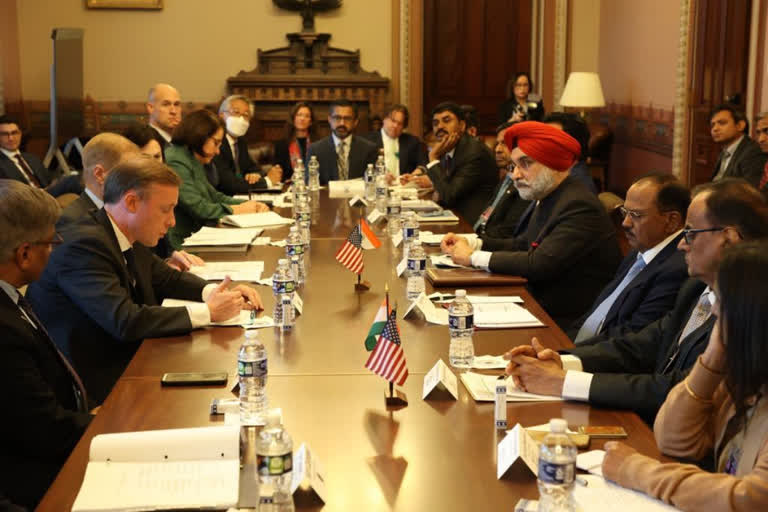Washington: India and the United States have elevated their strategic partnership with the launch of the initiative on Critical and Emerging Technology or iCET, the White House said as National Security Advisor Ajit Doval met his US counterpart Jake Sullivan here. We are committed to fostering an open, accessible, and secure technology ecosystem, based on mutual trust and confidence, that will reinforce our democratic values and democratic institutions, the White House in a fact sheet following the conclusion of the iCET inaugural meeting between Doval and Sullivan on Tuesday.
iCET is being launched at the direction of US President Joe Biden and Prime Minister Narendra Modi who after their Tokyo meeting in May 2022 had announced to elevate and expand the strategic technology partnership and defense industrial cooperation between the governments, businesses, and academic institutions of the two countries.
The United States and India affirm that the ways in which technology is designed, developed, governed, and used should be shaped by our shared democratic values and respect for universal human rights. We are committed to fostering an open, accessible, and secure technology ecosystem, based on mutual trust and confidence, that will reinforce our democratic values and democratic institutions, the White House said.
Doval and Sullivan were joined by high level officials from both sides in the meeting. The US delegation included the Administrator of the National Aeronautics and Space Administration, Director of the National Science Foundation, Executive Secretary of the National Space Council, and senior officials from the Department of State, Department of Commerce, Department of Defense, and National Security Council.
The Indian delegation included Ambassador of India to the United States, the Principal Scientific Advisor to the Government of India, Chairman of the Indian Space Research Organization, Secretary of the Department of Telecommunications, Scientific Advisor to the Defense Minister, Director General of the Defence Research and Development Organization. Senior officials from the Ministry of Electronics and Information Technology and the National Security Council Secretariat also participated in the talks.
The two sides discussed opportunities for greater cooperation in critical and emerging technologies, co-development and co-production, and ways to deepen connectivity across our innovation ecosystems. They noted the value of establishing innovation bridges in key sectors, including through expos, hackathons, and pitch sessions. They also identified the fields of biotechnology, advanced materials, and rare earth processing technology as areas for future cooperation, the White House said.
This is about taking those (existing) kinds of efforts to a different level and having it come from first and foremost from President Biden and Prime Minister Modi, from the leader level directly down to their national security advisors helps to energise our respective bureaucracies and establishments that this is a serious business and that we need to ensure that we are eliminating obstacles and barriers that stood in our way in the past and moving forward because a strategic decision that both countries have decided is for mutual benefit, really for the benefit of the world, a senior administration official told a group of Indian reporters after the conclusion of the inaugural session of the iCET dialogue.
Following the dialogue, a senior administration official said, they expect an intensified pace of high-level engagements along the way. The first category is focused on strengthening innovation ecosystems in both India and the US. As part of this, the two countries announced a new invitation arrangement for a partnership between the National Science Foundation and the Indian science agencies to expand collaboration in a range of areas including artificial intelligence, quantum technologies and advanced wireless technologies.
